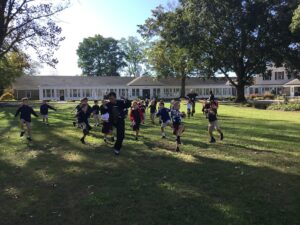
By Bertina Hsu-Miller
PreK-12 Chinese Curriculum Coordinator
One essential element of teaching with Organic World Language is that classes are nearly always conducted exclusively in the target language. The self-control and critical thinking necessary for this to take place is substantial, and each year students ask me, “Why do you only speak in Mandarin? Why can’t we speak in English?” So, during our recent English debrief time, I shared this story:
Imagine that you want to learn how to play soccer. You may have kicked a ball a few times, and you know what a soccer ball looks like, but you’ve never played an entire game of soccer. So, you sign up to join a team and I’m your coach. When you arrive to the field, I happily greet you, introduce myself, and invite you to sit on the bench. Thr oughout the practice, I proceed to tell you all about soccer: the history, rules, positions, and maybe some famous players. I describe how to run and kick the ball, but you never actually get off the bench, nor do you run or kick the ball. If I continued doing this for every practice of the season, what kind of soccer player would you become? Would your soccer skills really change?
oughout the practice, I proceed to tell you all about soccer: the history, rules, positions, and maybe some famous players. I describe how to run and kick the ball, but you never actually get off the bench, nor do you run or kick the ball. If I continued doing this for every practice of the season, what kind of soccer player would you become? Would your soccer skills really change?
New scenario: Again, you want to learn how to play soccer, and I’m your coach. But this time, when you get to the field, there are kids everywhere playing and practicing lots of different soccer skills. I invite you to join us and you look around and say, “No, thanks. That looks hard. I’m just going to sit on the bench and watch.” If you sat on the bench for every practice, what kind of soccer player would you become? Would your soccer skills really change?
Students agree that both situations would not lead to much improvement in their skills. Regarding the first scenario, one astute first grader said, “If you did all that stuff, you wouldn’t be a coach, you’d be a history teacher.” In Mandarin class, it’s hard not to use English, and it’s hard not to translate for your friend who’s momentarily confused. But hard can still be fun! The moral of both stories: using English during Mandarin class puts your brain “on the bench”. Stay off the bench and come play with us!
 Neurological connections in the brain are far stronger when people piece together meaning for themselves rather than being told an answer, and I share this with the students so they can understand that being temporarily frustrated or confused is okay! In fact, I promise that it will happen during the year. When they use the physical and visual clues around them, are patient with themselves, and keep trying, they will eventually understand, even if it takes several classes or weeks. Once they get it, no one can take that comprehension away; it’s theirs to keep!
Neurological connections in the brain are far stronger when people piece together meaning for themselves rather than being told an answer, and I share this with the students so they can understand that being temporarily frustrated or confused is okay! In fact, I promise that it will happen during the year. When they use the physical and visual clues around them, are patient with themselves, and keep trying, they will eventually understand, even if it takes several classes or weeks. Once they get it, no one can take that comprehension away; it’s theirs to keep!
“Productive struggle” is crucial for progress in any subject area, academic or otherwise. Consequently, it’s a consistent goal as I nudge my students’ language proficiency while trying to keep it meaningful, dynamic, organic, memorable, and fun. Student engagement is naturally higher when these elements merge with just the right amount of challenge. It’s hard for me as a teacher, and some lessons are better than others, but it’s journey in growth for all of us that I love! The payoff in excitement when students make connections, take linguistic risks, improve their proficiency, understand and use humor in Mandarin, and share how they use the language outside of class makes our collective efforts completely justifiable.
Angela Duckworth uses the term “desirable [not always desired] difficulty” in developing grit and I find it very fitting here. When it’s time for class, we have 3 expectations: be respectful, participate, and speak in Mandarin. It’s hard work. But the results are worth it!
See the full blog on the Germantown Academy website.
